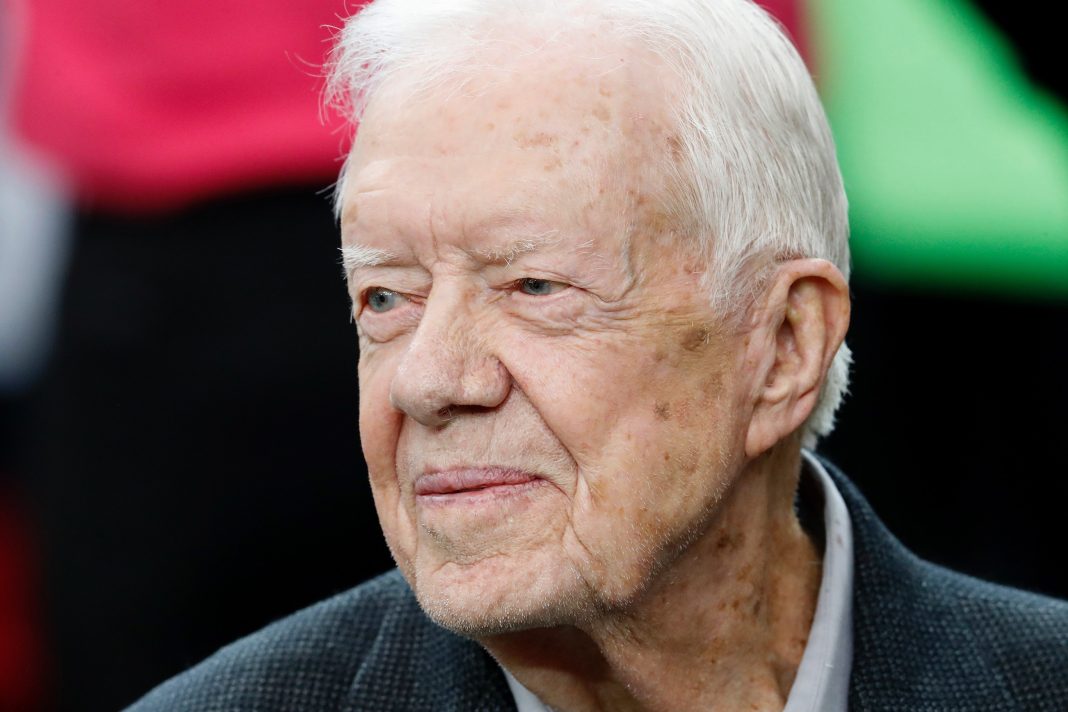Jimmy Carter, the earnest peanut farmer who as US president struggled with a bad economy and the Iran hostage crisis but brokered peace between Israel and Egypt has died at his home in Plains, Georgia, the Carter Centre said. He was 100.
“My father was a hero, not only to me but to everyone who believes in peace, human rights, and unselfish love,” said Chip Carter, the former president’s son. “My brothers, sister, and I shared him with the rest of the world through these common beliefs”.
A Democrat, Carter served as president from January 1977 to January 1981 after defeating incumbent Republican President Gerald Ford in the 1976 US election. Carter was swept from office four years later in an electoral landslide as voters embraced Republican challenger Ronald Reagan, the former actor and California governor.
Carter’s one-term presidency was marked by the highs of the 1978 Camp David accords between Israel and Egypt, bringing some stability to the Middle East. But it was dogged by an economy in recession, persistent unpopularity and the embarrassment of the Iran hostage crisis that consumed his final 444 days in office.
In recent years, Carter experienced several health issues including melanoma that spread to his liver and brain. Carter decided to receive hospice care in February 2023 instead of undergoing additional medical intervention. His wife, Rosalynn Carter, died in November, 2023, at age 96. He looked frail when he attended her memorial service and funeral in a wheelchair.
Carter left office profoundly unpopular but worked energetically for decades on humanitarian causes. He was awarded the Nobel Peace Prize in 2002 in recognition of his “untiring effort to find peaceful solutions to international conflicts, to advance democracy and human rights, and to promote economic and social development.”
A Southern Baptist Sunday school teacher since his teens, Carter brought a strong sense of morality to the presidency, speaking openly about his religious faith.
Despite his difficulties in office, Carter had few rivals for accomplishments as a former president. He gained global acclaim as a tireless human rights advocate, a voice for the disenfranchised and a leader in the fight against hunger and poverty, winning the respect that eluded him in the White House.
Carter won the Nobel Peace Prize in 2002 for his efforts to promote human rights and resolve conflicts around the world, from Ethiopia and Eritrea to Bosnia and Haiti. His Carter Centre in Atlanta sent international election-monitoring delegations to polls around the world.
The Middle East was the focus of Carter’s foreign policy. The 1979 Egypt-Israel peace treaty, based on the 1978 Camp David accords, ended a state of war between the two neighbours.
Carter brought Egyptian President Anwar Sadat and Israeli Prime Minister Menachem Begin to the Camp David presidential retreat in Maryland for talks. Later, as the accords seemed to be unravelling, Carter saved the day by flying to Cairo and Jerusalem for personal shuttle diplomacy.
The treaty provided for Israeli withdrawal from Egypt’s Sinai Peninsula and establishment of diplomatic relations. Begin and Sadat each won a Nobel Peace Prize in 1978.
By the 1980 election, the overriding issues were double-digit inflation, interest rates that exceeded 20 per cent and soaring gas prices, as well as the Iran hostage crisis that brought humiliation to America. These issues marred Carter’s presidency and undermined his chances of winning a second term.
In November 1979, revolutionaries devoted to Iran’s Ayatollah Ruhollah Khomeini stormed the US Embassy in Tehran, seized the Americans present and demanded the return of the ousted shah Mohammad Reza Pahlavi, who was backed by the United States and was being treated in a US hospital.
The American public initially rallied behind Carter. But his support faded in April 1980 when a commando raid failed to rescue the hostages, with eight US soldiers killed in an aircraft accident in the Iranian desert.
Carter’s final ignominy was that Iran held the 52 hostages until minutes after Reagan took his oath of office on January 20, 1981, to replace Carter, then released the planes carrying them to freedom.
Not all of Carter’s post-presidential work was appreciated.
In 2004, Carter called the Iraq war launched in 2003 by President George W Bush one of the most “gross and damaging mistakes our nation ever made.” He called the younger Bush’s administration “the worst in history” and said Vice President Dick Cheney was “a disaster for our country.”
In 2019, Carter questioned Republican Donald Trump’s legitimacy as president, saying “he was put into office because the Russians interfered on his behalf.” Trump responded by calling Carter “a terrible president.”



